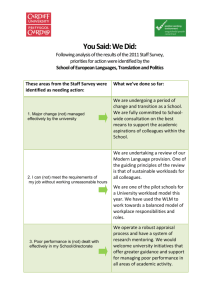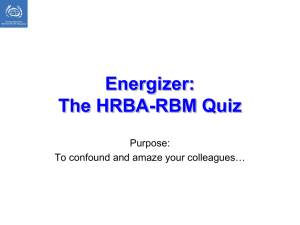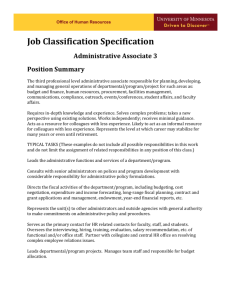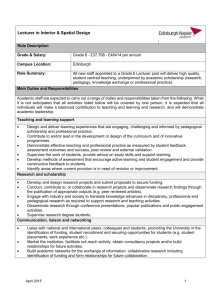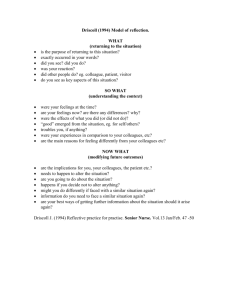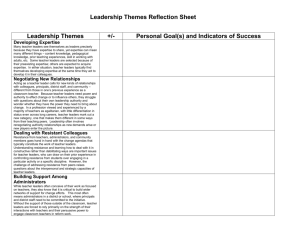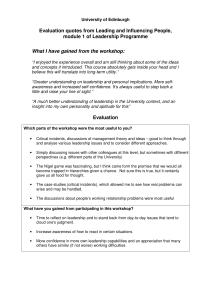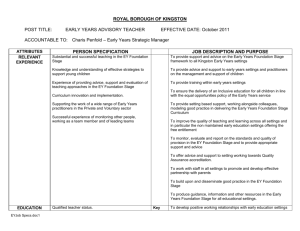COASTAL CAROLINA UNIVERSITY DEPARTMENT OF POLITICS
advertisement
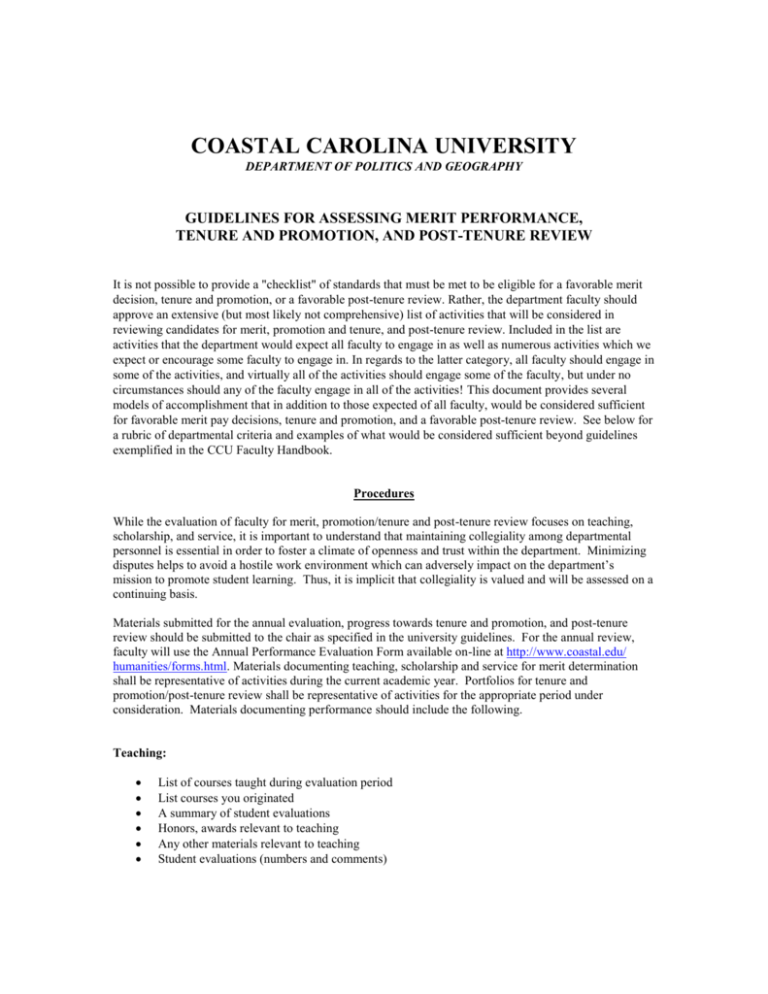
COASTAL CAROLINA UNIVERSITY DEPARTMENT OF POLITICS AND GEOGRAPHY GUIDELINES FOR ASSESSING MERIT PERFORMANCE, TENURE AND PROMOTION, AND POST-TENURE REVIEW It is not possible to provide a "checklist" of standards that must be met to be eligible for a favorable merit decision, tenure and promotion, or a favorable post-tenure review. Rather, the department faculty should approve an extensive (but most likely not comprehensive) list of activities that will be considered in reviewing candidates for merit, promotion and tenure, and post-tenure review. Included in the list are activities that the department would expect all faculty to engage in as well as numerous activities which we expect or encourage some faculty to engage in. In regards to the latter category, all faculty should engage in some of the activities, and virtually all of the activities should engage some of the faculty, but under no circumstances should any of the faculty engage in all of the activities! This document provides several models of accomplishment that in addition to those expected of all faculty, would be considered sufficient for favorable merit pay decisions, tenure and promotion, and a favorable post-tenure review. See below for a rubric of departmental criteria and examples of what would be considered sufficient beyond guidelines exemplified in the CCU Faculty Handbook. Procedures While the evaluation of faculty for merit, promotion/tenure and post-tenure review focuses on teaching, scholarship, and service, it is important to understand that maintaining collegiality among departmental personnel is essential in order to foster a climate of openness and trust within the department. Minimizing disputes helps to avoid a hostile work environment which can adversely impact on the department’s mission to promote student learning. Thus, it is implicit that collegiality is valued and will be assessed on a continuing basis. Materials submitted for the annual evaluation, progress towards tenure and promotion, and post-tenure review should be submitted to the chair as specified in the university guidelines. For the annual review, faculty will use the Annual Performance Evaluation Form available on-line at http://www.coastal.edu/ humanities/forms.html. Materials documenting teaching, scholarship and service for merit determination shall be representative of activities during the current academic year. Portfolios for tenure and promotion/post-tenure review shall be representative of activities for the appropriate period under consideration. Materials documenting performance should include the following. Teaching: List of courses taught during evaluation period List courses you originated A summary of student evaluations Honors, awards relevant to teaching Any other materials relevant to teaching Student evaluations (numbers and comments) Scholarship: Professional publications (attach title page of publication for portfolios) Grants – name and purpose Presentations Participation at conferences Participation at workshops Committee participation for an organization or conference Refereeing work: including editing, evaluation of proposals, reviews of text proposals Academic honors, awards, etc. Membership in professional organizations Service: Department Edwards College of Humanities and Fine Arts University University system Community State/National/International Offices and/or Committees Procedures for Tenure and Promotion/Post-Tenure Review It is recommended that the department chair and the faculty member review the materials prior to submitting the material. Faculty will follow checklists and content requirements in the Appendices of the Coastal Carolina University Handbook as provided on the university website. Check lists are frequently updated and the chair and faculty member should be aware of said changes to format, regulations and submission guidelines. Evaluation Rubric: Throughout this document exemplary/good characteristics that will be considered in reviewing annual faculty evaluation as well as applications for tenure and promotion/post-tenure review are marked by an asterisk (*). Evaluation for merit, promotion/tenure, and post-tenure review will focus on the following categories: collegiality, teaching, scholarship, and service. Collegiality is prized since it contributes to overall harmony within the department and promotes the departmental goal of enhancing student learning. While teaching clearly is the major focus of evaluating faculty performance (60%), it is important to understand that scholarship is essential for maintaining currency within the discipline and service (department, college and university) provides support for the overall university mission. 2 A. Collegiality: Performance Factor Collegiality Cooperation Problem Solving Exceeds Treats all members of the department with courtesy and respect. Works collaboratively to resolve or minimize disputes. Can disagree on departmental and academic issues without personalizing arguments or contributing to a hostile environment. Exhibits strong team leaderships skills with colleagues teaching likecourse content; coordinates teaching activities with colleagues of similar courses; shares/offers materials when asked; assists colleagues with course content and assessment when approached; uses resources to best configuration. Strong writing and speaking skills; initiates and shared effective recruitment tactics for department. Demonstrates ability to think through how an action could affect colleagues. Meets Treats all members of the department with courtesy and respect. Can disagree on departmental and academic issues without personalizing arguments or contributing to a hostile environment. Does Not Meet Does not treat all members of the department with courtesy and respect. Cannot disagree on departmental and academic issues without personalizing arguments or contributing to a hostile environment Identifies and utilizes resources to accomplish work; works with a team and provides support; keeps others apprised of issues related to the job; involved in recruitment efforts. Unable or unwilling to cooperate with colleagues to accomplish work; does not keep others apprised; chooses to work independently of colleagues with likecourse content; does not apprize colleagues or mentors of issues related to the job; does not communicate well with others regarding teaching activities, content or resources; unwilling to partake in effective recruiting efforts. Generally understands how actions will affect colleagues. Unable to visualize what effect actions will have on colleagues. Characteristics that Exhibit Exemplary/Good Collegiality in Conjunction to Chart: 1.* 2.* 3.* 4.* 5.* 6.* Treats all members of the department; faculty, staff and students with respect and courtesy. Works collaboratively to resolve or minimize disputes. Shares expertise to assist colleagues with teaching and/or scholarship. Gives appropriate credit for direct or indirect assistance received from colleagues. Assists colleagues when needed by covering classes, meetings, etc. for colleagues. Can agree to disagree on departmental/academic issues without personalizing arguments or encouraging/contributing to a hostile environment. 3 B. Teaching Performance Factor Scholarship/Creative Activities Cooperation Problem Solving Exceeds Annually reviews and updates syllabi; remains current with course content; demonstrates scholarship/research in teaching; utilizes current and effective text materials; utilizes technology where applicable; regularly develops new courses that fit degree content requirements; occasionally teaches honors, independent study, and special topics courses; demonstrates and shares innovative ideas for teaching and course development. Exhibits strong team leaderships skills with colleagues; coordinates teaching activities with colleagues of similar courses; shares/offers materials when asked; assists colleagues with course content and assessment when approached; uses resources to best configuration. Demonstrates ability to think through an action before proceeding; comes to sound decisions with little or no need for mentoring or supervision; works with colleagues to mutually resolve issues in teaching; exemplifies professional ethics. Meets Syllabi and course materials meet minimum university and accreditation indicators; text and course materials are updated at least every three to five years; aware of accreditation requirements; utilizes some form of technology in classroom teaching where applicable; student assessment process is effective. Does Not Meet Syllabi are demonstratively outdated or unchanged for several years; text and course material do not meet accreditation standards; does not incorporate any technology in teaching; not participating in university development workshops for technology in teaching; student assessment processes are ineffective. Identifies and utilizes resources to accomplish work; works with a team and provides support; keeps others apprised of issues related to the job; involved in recruitment efforts. Unable or unwilling to cooperate with colleagues to accomplish work; does not keep others apprised; chooses to work independently of colleagues; does not apprize colleagues of issues related to the job; does not communicate well with others. Solves average problems with minimal assistance given reasonable time; demonstrates professional ethics. Unable to visualize what effect decisions will have in the classroom or with colleagues; looks to others to solve disputes; does not follow university policy or proper procedural guidelines; has occasional written student grievances; exhibits consistent harassment tendencies. Characteristics that Exhibit Exemplary/Good Teaching in Conjunction to Chart: 1.* 2.* 3.* 4.* 5.* 6.* 7.* Presents effective lectures/discussions and promotes active learning. Encourages student/faculty contact and cooperation among students. Provides appropriate and prompt feedback. Fosters good student work habits, confidence and self-reliance. Gives homework assignments and examinations that reflect course objectives. Assigns grades in a reasonable and responsible manner consistent with department/university policies. Performs academic advising in a conscientious manner, including properly completing graduation applications and other relevant paperwork in a timely manner. 4 8. 9. 10. 11. 12. 13. 14. Incorporates new technology in teaching. Engages in the supervision of directed studies. Develops new programs or significantly revises existing programs. Develops materials for classes that can be used by other faculty members teaching those classes. Incorporates new developments in teaching. Develops new courses or significantly revises existing course content. Serves as advisor/coordinator to an academic student organization (e.g., Model UN, South Carolina Student Legislature, Phi Alpha Delta, Pi Sigma Alpha) C. Professional Activity/Professional Development Performance Factor Scholarship and Creative Activities Career Development Exceeds Shares, publishes and presents scholarship at regional, state, national or international organizations and conferences. Outstanding progress. Shows high potential for advancement. Interested in growing within organization and taking on more responsibilities. Cooperation Exhibits strong leadership skills in a team. Uses resources in best configuration. Strong writing and speaking skills. Presents job related materials accurately and effectively. Facilitates communication among others. Problem Solving Is able to think an action through before proceeding. Comes to sound decisions with no need for supervision. Works with colleagues. Exemplifies professional ethics. Meets Is successful in scholarship. Is active developing plans for national pursuits. Does Not Meet Does little scholarship/creative activities related to the discipline. Progressing and developing as expected based upon outlined career goals. Seeking further career development opportunities. Identifies and utilizes resources to accomplish work. Works with a team and provides support. Communicates effectively in oral and written form. Keeps others apprised of issues related to the job. Progress slow. Growth limited by a lack of initiative. Apathetic regarding career development. Can solve average problems with minimal assistance given enough time. Demonstrates professional ethics. Unable or unwilling to cooperate with a team to accomplish work. Works only independently of colleagues and department as a whole. Does not keep others sufficiently apprised of issues related to the job. Does not communicate well in meetings. Not able to visualize what effect decisions will have. Does not attempt to work out problems, looks for least plausible solutions. Does not follow university policy and procedural guidelines. Characteristics of Exemplary/Good Research Activities in Conjunction to Chart: 1.* 2.* 3.* 4.* Remains current in field(s) of specialization. Applies expertise in academic/curricular solving problems. Participates in scholarship within the disciplines of the department or in education within these disciplines. Refereed presentations and/or publications. 5 5. 6. 7. 8. 9. 10. 11. 12. 13. 14. Non-refereed publications. Textbooks or chapters of textbooks. Presentations to professional organizations. Incorporation their research into the classroom setting. Service on a scholarly panel for a panel discussion during a regional or national meeting. Advisor to students traveling to regional and/or national conferences to present their research. Gives workshops for other faculty in pedagogy for, or content within, the disciplines. Serves as a consultant in discipline. Attends meetings of professional association(s). Learns and applies new pedagogical programs, software, etc. to teaching. D. Service Performance Factor Professional Outreach Exceeds Provides professional leadership to outside organizations. University and College Service Supports the mission and priorities of the university and academic community through active and consistent participation in governance and university initiatives. Department Service Supports the mission and priorities of the department through active participation in volunteered governance and department initiatives. Contributes to community substantially or takes a leadership role in community activity that enhances university/community relations. Community Service Meets Participates in activities outside the university community to share professional knowledge. Serves the university and academic community and service projects on a fairly consistent basis. At least one universitywide or college-wide committee or service project every two to three years. Serves the department community and service projects when available. Participates in activities outside the university community to share professional knowledge. Does Not Meet Does not share professional knowledge outside the university community. Not interested in serving the university or academic community other than as required by job. Only becomes involved if release time or extra pay is provided. Consistently fails to attend committee meetings. No interest in representing the department community other than as required by job. Only becomes involved if release time or extra pay is involved. No interest in representing the university favorably in the community. Characteristics of Exemplary/Good Professional Service in Conjunction to Chart 1.* 2.* 3.* 4.* 5. 6. 7. 8. Attends department meetings. Serves on departmental committees (including search committees). Serves on college or university committees. Attends candidate talks and open meetings with candidates for positions in the department. Serves on extra-departmental search committees. Attends Faculty Senate or university committee meetings. Advises student organizations. Participates in university activities (i.e., Convocation, Graduation, lecture series, etc.). 6
